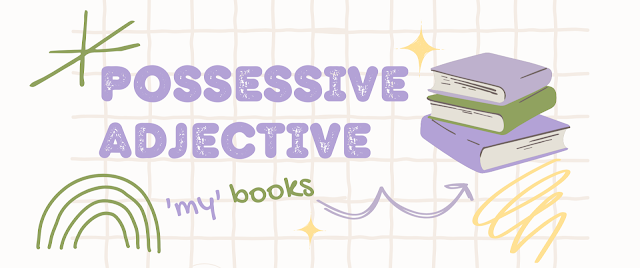ESA PEDIA: Possesive Adjective
Hi fellas! This time, ESA FKIP UNRI is here to provide reading material with beneficial knowledge. For those of you who enjoy learning English, we're here with the topic of Possessive Adjectives. Let's pay attention from the beginning to the end.
In the big world of language, possessive adjectives are important for showing what belongs to someone, how things are related, and who someone is. Even though people use possessive adjectives a lot, they can be hard for people learning a language or even people who are good at speaking. In this helpful blog, we'll talk about Possessive Adjectives in detail, explaining how they work and giving useful tips for using them correctly.
Possesive Adjective is really important for us to learn because it is a basic grammar. Possessive Adjective have been called "Possessive Determiner" since 1960s. Both terms are still commonly used. The use of the term "Possessive Adjective" however is currently about more popular than "Possessive Determiner”. The subjects (I, you, she, he ,it, we, they) for Possessive Adjective (my, your, her, his, its, our, their) are called Possessive Determiner or Possessive Adjective. Possessive Adjective is the possessive forms before a noun in the determiner position. These are the example:
- My book is purple: "My" is a possessive adjective indicating ownership. It shows that the book belongs to the speaker.
- Your flower is very fresh: "Your" is a possessive adjective indicating ownership. It shows that the flower belongs to the person being spoken to.
- Her bracelet looks expensive: "Her" is a possessive adjective indicating ownership. It shows that the bracelet belongs to a female person previously mentioned or implied.
- His name is so unique and easy to remember: "His" is a possessive adjective indicating ownership. It shows that the name belongs to a male person previously mentioned or implied.
- You can see my new car. Its a new model in this year: "My" is a possessive adjective indicating ownership. It shows that the car belongs to the speaker.
- Our graduation will be heald successfully: "Our" is a possessive adjective indicating ownership. It shows that the graduation ceremony belongs to a group that includes the speaker.
- Their house is really big, they worked very hard to make the house: "Their" is a possessive adjective indicating ownership. It shows that the house belongs to a group of people previously mentioned or implied.
As a learner, you have to be aware for some mistakes. The first common mistake is the confusion between "its" and "it’s." Remember, when indicating possession, you should write "its." The use of "it’s" is a contraction of "it is," which means this/that is. The second common mistake is also about writing. "You’re" and "your" often confuse people on how to use them. "You’re" is a contraction of "you are," which means you are. When indicating possession, the correct writing is "your," which means yours. The last common mistake is the confusion between "There," "their," and "they’re" are also still one of the common mistakes made in English. When indicating possession, the correct writing is "their," which means belonging to them. Even though they sound the same, make sure not to confuse them.
If you want to master this material, begin to practice with;
- Contextual Examples: engage in exercises and activities that provide contextualized examples of possessive adjectives in use, such as filling in the blanks in sentences or describing personal belongings.
- Compare and Contrast: compare possessive adjectives across languages to understand their similarities and differences, which can deepen your grasp of their usage and rules.
- Seek Feedback: regularly practice using possessive adjectives in conversation or writing, and seek feedback from native speakers or language instructors to refine your skills.
Possessive adjectives may seem small in size, but they wield significant power in language, enabling speakers to express ownership, relationships, and identity with precision. By demystifying the intricacies of possessive adjectives and honing your understanding of their usage, you can enhance your communication skills and navigate the linguistic landscape with confidence and clarity.
SOURCES:
- Journal of Applied Linguistics Studies Vol. 1. No. 1, October 2022, pp. 31-37 : THE ANALYSIS OF STUDENTS’ ABILITY TO USE POSSESSIVE ADJECTIVE IN WRITING DESCRIPTIVE TEXT AT JUNIOR HIGH SCHOOL
- Journal of English Education Program, Vol. 9 No. 2, July 2022 : AN ANALYSIS OF STUDENTS’ ERRORS IN USING POSSESSIVE ADJECTIVES IN THEIR WRITING TASKS (A CASE STUDY AT THE TENTH GRADE OF A VOCATIONAL SCHOOL IN SINGAPARNA, TASIKMALAYA)








Comments
Post a Comment